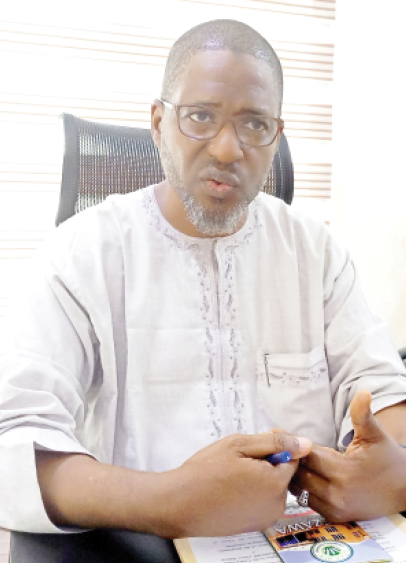‘We are protecting both farmers and grain buyers’
Alhaji Mohammed Rabiu El-Yakub is the Managing Director and Chief Executive Officer (MD/CEO) of the newly built Gezawa Commodity Market and Exchange. In this interview, he explains the new innovations they are bring into the grain market. What do you basically do here that is different from other markets? Basically, we provide a platform where […]

Mohammed Rabiu El-Yakub
Alhaji Mohammed Rabiu El-Yakub is the Managing Director and Chief Executive Officer (MD/CEO) of the newly built Gezawa Commodity Market and Exchange. In this interview, he explains the new innovations they are bring into the grain market.
What do you basically do here that is different from other markets?
Basically, we provide a platform where buyers of agricultural commodities meet sellers and transactions take place under our supervision in such a way that we protect both the buyers and the sellers. You find out that at most times the farmer is at the losing end of the transactions because he is very local. The buyer is more informed about what is happening in the world about commodities compared to a local farmer or a local community agent who does not have information about what is happening in the global market.
Our system provides a platform where we can take care of both interests so that the buyer gets value for his money and the seller also gets value for his labour.
We intend to do this in two forms: the first form is what we call Over-the-Counter Spot Market. This is an open market where people bring in bags of maize, rice or whatever to the market and are graded based on what is physically on ground without necessarily taking it for processing or cleaning. In that way we intend to be like other traditional markets, only that in this sense we’re now part of the supervision of the transactions that I said earlier.
We try to go along with what is obtained locally that gives us a platform or an essential stage where we can build on and then proceed to the second stage of the market where we take over the exchange platform which is basically trading under an exchange system that will be done electronically, which allows people to participate globally to engage in trading commodities. First it’s over-the-counter spot market and then the second stage is over-the-exchange spot market.
How are local farmers embracing this new development because this may be different from their traditional way of harvesting and transacting in the market?
We opened the over-the-counter spot market on June 17, but we realised that between that period and now is not actually the season for trading commodities, because the trading pattern in Nigeria is seasonal. We expect more activities as we enter October, and as soon as the season picks up, people will be encouraged to bring in their goods. We will also provide some incentives for people who bring in their goods in terms of free storage for a period like a week or so. After that, people can then begin to pay for storage.
So, this is basically our plan, but in this case we have also, on our own part, tried to generate some kind of activities in the market using what we call “market markers”. These are partnerships that we have jointly formed so that they will engage in trading in the market and then people will now see that activities are going on. That way they would be encouraged to come in themselves to participate, and that one has been taking place.
Since we opened, people have been coming on retail basis to trade in commodities, especially maize, which we have been able to stock for that period. We’re hoping that when the season starts people will be more encouraged to bring in their goods.
What is your storage capacity in this market?
We have basically two types of warehouse: the first one can store up to 450 trucks of grain, the second can store about 150 trucks of grain. These are the two main warehouses we have in phase one, but we have already proceeded to the second phase of our development, where we’re building four more warehouses that will be able to carry grains in excess of 450 trucks each.
